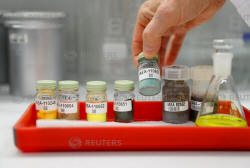Exclusive: Spain to block Berkeley uranium mine project
- sources
 Send a link to a friend
Send a link to a friend
 [October 17, 2018]
By Belén Carreño [October 17, 2018]
By Belén Carreño
MADRID (Reuters) - The Spanish government
has decided not to deliver the permits necessary to open the European
Union's only open-cast uranium mine near Salamanca, dealing a serious
blow to Australian mining company Berkeley Energia's <BKY.AX> plans.
The project was granted preliminary approval in early 2013 but has since
faced local opposition.
Berkeley later requested a trading halt on its shares, which fell nearly
29 percent in Australian trading hours on Tuesday, citing media articles
about the Salamanca mine.
The company asked the Australian Securities Exchange to suspend trading
until it released a statement on the Salamanca mine or until the opening
of trade on Oct. 19, whichever came first, according to the letter sent
to the regulator.
Berkeley said it had received no official notice from the Nuclear Safety
Council nor any other government department regarding its plans to open
the mine and had contacted the Spanish authorities to seek
clarification.

It said it would make an announcement as soon as a response had been
received.
Berkeley had said on Tuesday it was still confident it would obtain the
last two major permits needed for the mine to start operating - a local
building license and an authorization given by the government to handle
radioactive waste - though it would also scale down its existing local
corporate operations.
"The government will wait for the ongoing proceedings to go through but
it will say no," a government source said on condition of anonymity.
Spain's energy and environment ministry declined to comment. The Nuclear
Safety Council had no immediate comment.
A second source, directly involved in the proceedings, said Berkeley was
"living in a parallel universe" when it said the mine would soon become
a reality.
"The authorization to build the mine is only possible when the nuclear
authority has handed over its report, which is still a long way," said
the source, adding he believed the mine would never see the light of
day.
[to top of second column] |

Uranium samples are seen in the International Atomic Energy Agency
nuclear material laboratory in Seibersdorf, Austria June 13, 2018.
REUTERS/Leonhard Foeger/File Photo

The nuclear authority is due soon to renew its board and the Socialists and
junior parliamentary allies Podemos, who both oppose the project, will hold a
majority in it.
A neighboring mine run by public company ENUSA was previously in operation near
the site in Retortillo in Salamanca province, but closed in 2000 after it failed
to turn a profit.
Berkeley, which has a triple listing in Britain, Spain and Australia and
operates no other projects, has insisted the planned mine can be profitable
since conducting initial studies in 2007.
The price of uranium fell heavily following Japan's Fukushima nuclear disaster
of 2011 and for years struggled to recover.
This year, however, investors hope for profits as prices have rallied, helped by
London-listed investment vehicle Yellow Cake, which has been buying and storing
the element.
Berkeley said the mine would run for 14 years, generating investment of over 250
million euros ($290 million) and more than 2,500 direct and indirect jobs in the
region.
In a study presented to Australian investors, the firm said the mine is capable
of generating strong, sustainable cash flow as a result of recovering demand and
growing appetite for uranium ore coming from China.
(Reporting by Belen Carreno, additional reporting by Jose Elias Rodriguez in
Madrid and Barbara Lewis in London; writing by Julien Toyer; editing by Dale
Hudson and Louise Heavens)
[© 2018 Thomson Reuters. All rights
reserved.] Copyright 2018 Reuters. All rights reserved. This material may not be published,
broadcast, rewritten or redistributed.
Thompson Reuters is solely responsible for this content.
 |